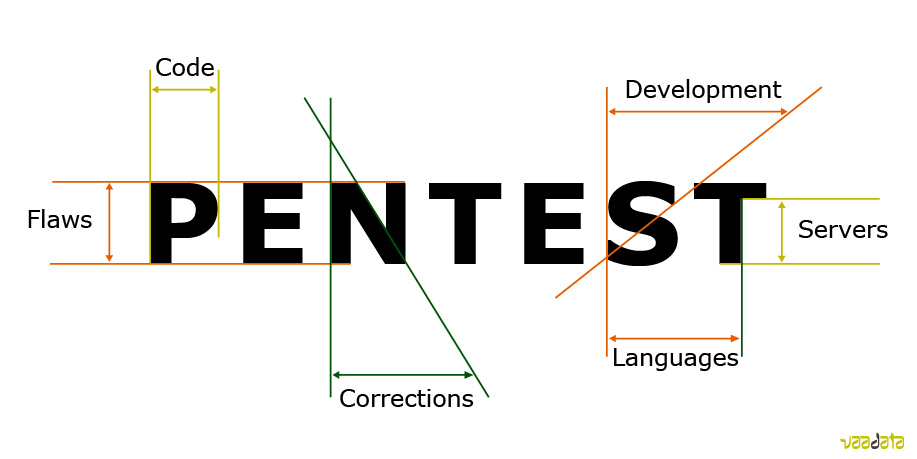
What is penetration testing (Pen Test)?
A penetration testing, also known as a pen test, is a simulated cyber attack against your computer system to check for exploitable vulnerabilities. In the context of web application security, penetration testing is commonly used to augment a web application firewall (WAF).
Penetration testing can involve the attempted breaching of any number of application systems, (e.g., application protocol interfaces (APIs), frontend/backend servers) to uncover vulnerabilities, such as unsanitized inputs that are susceptible to code injection attacks.
Insights provided by the penetration testing can be used to fine-tune your WAF security policies and patch detected vulnerabilities.
Who performs penetration testing (Pen Test)?
It’s best to have a penetration testing performed by someone with little-to-no prior knowledge of how the system is secured because they may be able to expose blind spots missed by the developers who built the system. For this reason, outside contractors are usually brought in to perform the tests. These contractors are often referred to as ‘ethical hackers’ since they are being hired to hack into a system with permission and for the purpose of increasing security.
Many ethical hackers are experienced developers with advanced degrees and a certification for pen testing. On the other hand, some of the best ethical hackers are self-taught. In fact, some are reformed criminal hackers who now use their expertise to help fix security flaws rather than exploit them. The best candidate to carry out a penetration testing (pen test) can vary greatly depending on the target company and what type of penetration testing (pen test) they want to initiate.
What are the types of penetration testing (Pen Test)?
- Open-box penetration testing (Pen Test) – In an open-box test, the hacker will be provided with some information ahead of time regarding the target company’s security info.
- Closed-box penetration testing (Pen Test) – Also known as a ‘single-blind’ test, this is one where the hacker is given no background information besides the name of the target company.
- Covert penetration testing (Pen Test) – Also known as a ‘double-blind’ penetration testing (Pen Test), this is a situation where almost no one in the company is aware that the penetration testing (Pen Test) is happening, including the IT and security professionals who will be responding to the attack. For covert tests, it is especially important for the hacker to have the scope and other details of the test in writing beforehand to avoid any problems with law enforcement.
- External penetration testing (Pen Test) – In an external test, the ethical hacker goes up against the company’s external-facing technology, such as their website and external network servers. In some cases, the hacker may not even be allowed to enter the company’s building. This can mean conducting the attack from a remote location or carrying out the test from a truck or van parked nearby.
- Internal penetration testing (Pen Test) – In an internal test, the ethical hacker performs the test from the company’s internal network. This kind of test is useful in determining how much damage a disgruntled employee can cause from behind the company’s firewall.

The Usage of penetration testing (Pen Test)
Identifying Vulnerabilities
Identifying vulnerabilities requires more than simply running a scan of your environment if you want to stop today’s sophisticated attacks.
Exploiting Vulnerabilities
It is one thing to identify that a vulnerability exists, but something completely different to be able to exploit that vulnerability and see how far you can have penetration testing (Pen Test) into the network and systems.
Understanding Advanced Tactics
To truly protect your environment you need to know which adversaries are more likely to target your organization so you can mimic their advanced tactics to better pen test your defenses.
Penetration Testing (Pen Test) And Web Application Firewalls
Penetration testing (Pen Test) and WAFs are exclusive, yet mutually beneficial security measures.
For many kinds of pen testing (with the exception of blind and double blind tests), the tester is likely to use WAF data, such as logs, to locate and exploit an application’s weak spots.
In turn, WAF administrators can benefit from pen testing data. After a test is completed, WAF configurations can be updated to secure against the weak spots discovered in the test.
Finally, penetration testing (Pen Test) satisfies some of the compliance requirements for security auditing procedures, including PCI DSS and SOC 2. Certain standards, such as PCI-DSS 6.6, can be satisfied only through the use of a certified WAF. Doing so, however, doesn’t make penetration testing (Pen Test) any less useful due to its aforementioned benefits and ability to improve on WAF configurations.
Phases of penetration testing (Pen Test)
Penetration testers (Pen Testers) aim to simulate attacks carried out by motivated adversaries. To do so, they typically follow a plan that includes the following steps:
- Reconnaissance. Gather as much information about the target as possible from public and private sources to inform the attack strategy. Sources include internet searches, domain registration information retrieval, social engineering, non intrusive network scanning, and sometimes even dumpster diving. This information helps the pen tester map out the target’s attack surface and possible vulnerabilities. Reconnaissance can vary with the scope and objectives of the penetration testing (pen test), and might be as simple as making a phone call to walk through the functionality of a system.
- Scanning. The penetration tester (pen tester) uses tools to examine the target website or system for weaknesses, including open services, application security issues, and open source vulnerabilities. Pen testers use a variety of tools based on what they find during reconnaissance and during the test.
- Gaining access. Attacker motivations vary from stealing, changing, or deleting data to moving funds to simply damaging your reputation. To perform each test case, penetration testers (pen testers) must decide on the best tools and techniques to gain access to your system, whether through a weakness, such as SQL injection, or through malware, social engineering, or something else.
- Maintaining access. Once penetration testers (pen testers) gain access to the target, their simulated attack must stay connected long enough to accomplish their goals: modifying data, or abusing functionality. It’s about demonstrating the potential impact.
Penetration Testing (Pen Test) Versus Automated Testing
Penetration testing (Pen test) is mostly a manual effort. Penetration Testers (Pen testers) do use automated scanning and testing tools in the process. But they also go beyond the tools and think their way through security barriers using their knowledge of the latest attack techniques to provide more in-depth testing than a vulnerability assessment (i.e., automated testing) can provide. Here are a few comparative advantages of manual pen testing and automated testing:
Manual penetration testing (Manual pen testing)
Penetration testing (Pen test) uncovers vulnerabilities and weaknesses not found in popular lists (e.g., OWASP Top 10) and tests business logic that automated testing can overlook (e.g., data validation, integrity checks). Also, a manual penetration testing (pen test) review can help identify false positives reported by automated testing. Overall, manual penetration testers (pen testers) are experts who “think” like adversaries and can analyze data to target their attacks and test systems and websites in ways automated testing solutions following a scripted routine cannot.
Automated penetration testing (automated pen testing)
Automated penetration testing generates results faster, and needs fewer specialized professionals, than a fully manual penetration testing process. Automated penetration testing tools track results automatically and can sometimes export them to a centralized reporting platform. Also, while the results of manual penetration testing might vary from test to test, running automated penetration testing repeatedly on the same system will produce the same results.
Penetration Testing (Pen Test) Tools
There are a variety of automated penetration testing tools. Penetration testers can use to identify vulnerabilities in a network. Penetration testing (Pen test) tools typically scan code to look for any errors, loopholes, or malicious scripts that could increase the potential of a security breach.
While any managed security services provider will typically have a preferred penetration testing (Pen Test) tool that they use, there are a few key features that any penetration testing (Pen Test) tool should possess.
- Easy to Use: This may seem obvious, but deploying overly complicated and hard to manage the software makes it more likely that something won’t be configured correctly or some vulnerability will be missed due to oversight.
- Automated Verification: A good penetration testing (pen test) program should be able to verify any potential vulnerabilities automatically.
- Vulnerability Prioritization: Any vulnerabilities should be categorized and prioritized according to their severity so that testers will know which security gaps require immediate attention.
- Reverification: Known exploits should be easy to locate after they’ve been identified to facilitate speedy remediation.
- Detailed Reporting Features: Once the task is complete, the software needs to be able to generate a detailed, customizable log report that provides information about identified vulnerabilities.
What happens in the aftermath of a Penetration Testing (Pen Test)?
After completing a pen test, the ethical hacker will share their findings with the target company’s security team. This information can then be used to implement security upgrades to plug up any vulnerabilities discovered during the test. These upgrades can include rate limiting, new WAF rules, and DDoS mitigation, as well as tighter form validations and sanitization.
Benefits of Penetration Testing (Pen Test)
Ideally, your organization has designed its software and systems from the start with the aim of eliminating dangerous security flaws. It provides insight into how well you’ve achieved that aim. Pen testing supports the following security activities, among others:
- Finding weaknesses in systems
- Determining the robustness of controls
- Supporting compliance with data privacy and security regulations (e.g., PCI DSS, HIPAA, GDPR)
- Providing qualitative and quantitative examples of current security posture and budget priorities for management

Result Analysis & Reporting
The report will include a comprehensive and meaningful C-level summary of the executed Intelligence-led Penetration Testing (pen test) and Red Teaming assessment which will include security strengths, comprehensive analysis of organizational capability, with recommendations for remediation and enhancements.
The detailed report will also include the actual scenario-based attack as it played out, listing the attack elements (with respective evidence) that were critical to the success of the attack, such as the weaknesses discovered that enabled the Red Team to progress to the next stage.
Finally, a complete logbook of all actions performed by the Red Team will be provided to the customer containing timestamps, source & destination IP addresses, tools, command, description, output, result, etc.
What ITSec EU Limited Delivers
Your one-stop solution for all things related to Penetration Testing (Pen Test). Here, we delve into the world of Ethical Hacking, providing insights and guidance on Cybersecurity Testing. Our blog posts cover a wide range of topics including Security Audits, Vulnerability Assessment, Threat Modeling, and Risk Assessment.
We provide in-depth discussions on Security Controls Testing, Information Security Testing, and specialized testing areas such as Application Security Testing, Infrastructure Security Testing, Network Security Testing, Wireless Security Testing, Cloud Security Testing, IoT Security Testing, and Mobile Security Testing.
Our experts share their experiences with Social Engineering Tests and team-based approaches like Red Teaming, Blue Teaming, and Purple Teaming. We also provide guidance on important topics like Compliance Audits (PCI DSS, ISO 27001, GDPR, HIPAA), and how to plan for an effective Incident Response.
Our blog is also a resource for those interested in expanding their knowledge through Cybersecurity Training. We provide updates on the latest in Cyber Threat Intelligence, and discuss the benefits of services like Managed Security Services and Cybersecurity Consulting Services.
We believe in a proactive approach to security, which is why we also cover topics like Cybersecurity Risk Management, Data Breach Prevention, and the importance of a thorough Secure Code Review. And for those interested in the intersection of development and security, we have content on the emerging field of DevSecOps.
Internal Penetration Testing (Internal Pen Test)

Assesses your internal systems to determine if there are exploitable vulnerabilities that expose data or unauthorized access to the outside world: The test includes system identification, enumeration, vulnerability discovery, exploitation, privilege escalation and lateral movement.
External Penetration Testing (External Pen Test)

Assesses your Internet-facing systems to determine if there are exploitable vulnerabilities that expose data or unauthorized access to the outside world: It includes system identification, enumeration, vulnerability discovery and exploitation.
Web/Mobile Application Penetration Testing (Pen Test)
Evaluates your web/mobile application using a three-phase approach: 1) application reconnaissance, 2) discovery vulnerabilities and 3) exploit the vulnerabilities to gain unauthorized access to sensitive data.
Insider Threat Penetration Testing (Pen Test)
Identifies the risks and vulnerabilities that can expose your sensitive internal resources and assets to those without authorization: The team assess areas of escalation and bypass to identify vulnerabilities and configuration weaknesses in permissions, services and network configurations.
Wireless Penetration Testing (Pen Test)
Identifies the risks and vulnerabilities associated with your wireless network: The team assesses weaknesses such as deauthentication attacks, configurations, session reuse and unauthorized wireless devices.








Find Us immediately for the Security Assessment in Hong Kong, United Kingdom, Europe, Estonia, Singapore…
Case Reference: